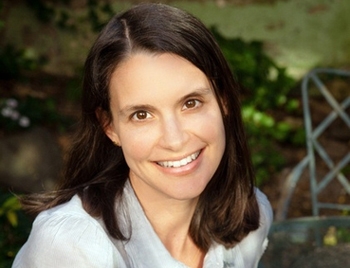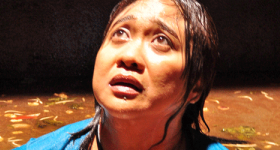Freudenberger
visits the theme of love in the age of the internet in her new novel, The Newlyweds. Amina, a young, bright
woman from Bangladesh, harbors dreams of leaving her little village and moving
to America where she can better support her struggling family. When she meets
George, an American, at an online dating site, the dream starts to become to a
possibility.
A
computer engineer in Rochester, George has been both hurt and disillusioned by
love in the past. His motives in courting Amina are clear: he wants a wife and
he has decided that no American woman can fulfill that role. Despite their
personal, cultural and social differences, George and Amina decide to marry. It
is only when Amina finally sets up home in Rochester that she is forced to take
off her rose-tinted glasses and see America, her husband, and his family for
what they truly are: a flawed country where opportunity can only take her so
far and a flawed family whose secrets and demons will threaten to tear her
marriage and her sense of identity apart.
Freudenberger
is the author of the much-lauded collection of short stories Lucky Girls, and the novel The Dissident. In an interview with the
Huffington Post, Freudenberger speaks of her fascination with culture clash and
her meeting with a Bangla woman, Farah, on a plane to Rochester whose own
recent marriage inspired her to write The
Newlyweds.
In many ways, Amina’s is a story
of reinvention. Early in the novel, the loss of her virginity signifies her
entry into a new world. The old Amina, the one in Bangladesh would never have agreed
to have sex before her wedding night, and yet, in America, Amina feels as if
the old rules and customs don’t apply to her anymore. Reassessing her stand on
pre-maritial sex, Amina notes to herself that, “it seemed to her that there
were a lot of other things that could be lost in an equally permanent way. Her
parents had lost their land in the village… her grandmother had lost Emdad and
Khokon… Compared with all those losses, whatever it was that Amina had lost on
the third night she spent in George’s house was nothing.”

Photo of the author by David Jacobs
On a surface level, Freudenberger
is literally telling someone else’s story: that of Farah, a Bangla woman whom
she met on a flight to Rochester, with whose consent and approval she developed
the narrative. On a deeper level, Freudenberger places herself in an alien
context. As a white, Jewish, American woman she is writing about a brown,
Bangla, Muslim woman’s immigrant experience in America. Does she have the right
to do this? More importantly, does she succeed?
The answer to the first question
must always be: Yes. Writing, especially fiction, is an exploration of worlds
both known and unknown.
As to whether or not she succeeds
in writing honestly
about a culture that is not hers, the answer is both yes and no.
For one, Freudenberger uses the
third-person narrator whose voice can easily be Amina’s or that of an
omniscient being (as narrators tend to be). She uses the narrator to bridge the
gap between the cultures by providing access into Amina motives and a bird’s
eye view of her world. While this helps to paint a sympathetic image of Amina,
it removes the reader from being completely enmeshed in Amina’s plight, turning
a critical eye on her instead. Further, when the author revisits Amina’s wish to
have a child multiple times throughout the book, the repetition and
clarification of motives appear superfluous. It also reminds the reader that
the book has been written for a Western audience who may need to be reoriented
with the cultural context of Amina’s decisions.
At times, when the narrator’s
attention shifts to the other characters, it is subtly disorienting. Freudenberger’s
depiction of Amina’s friend Kim and her relationship with her lover Ashok is
especially mired in clichés as the free-spirited Kim tries
to mold herself into the perfect Indian wife, or Freudenberger’s version of it.
She learns to wash her feet the Indian way (“…squeezing a drop of antibacterial
soap onto each foot and then expertly washing one with the other, using a
frantic scrubbing motion.”); she learns to cook, clean and shop for him. She
“learned to put things away immediately after using them and to wash pots as
she cooked, since it was hard for her husband to enjoy a meal if he could see
the dirty pots sitting out in the open kitchen.” For those of us raised in
South Asia, this portrayal of Ashok can be a little cringe-worthy. And despite
her emotional scars, Kim comes off as just another yoga-loving, incense-burning
American hippie who went to India to find her soul but lost her heart instead.
In the end, the strength of the
book lies in Freudenberger’s understanding of cultural complexities. She
captures both worlds, Bangla and American, and the plight of immigrants in a
realistic and sincere manner.
Anisha
Sridhar is a writer and current graduate student at NYU. She blogs at www.anishasridhar.wordpress.com.









Comments